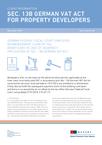
German Federal Fiscal Court simplifies reimbursement claim in case of incorrect apllication of sec. 13B German VAT Act
1. The Decision
In its ruling dated 27/9/2018 (V R 49/17), the Federal Fiscal Court (Bundesfinanzhof – BFH) put the tax authorities in their place. In its letter dated 26/7/2017, the Federal Ministry of Finance (Bundesministerium der Finanzen – BMF) had formulated increased requirements for the reimbursement claim of property developers who had incorrectly paid the value added tax (VAT) for construction services received in accordance with Sec. 13b of the German VAT Act (UStG) due to the administrative opinion applicable at the time. The BMF determined this claim for reimbursement by the way that the recipient of the service either proves that they have fulfilled the claim for subsequent payment made against them by the contractor performing the work or that the tax office had the option of offsetting the claim. The BFH has now declared these requirements to be irrelevant. Property developers can thus reclaim the unduly paid VAT on the basis of the general procedural requirements.
2. Background
The most recent decision of the BFH is part of a series of further BFH rulings on the so-called ‘property developer cases’. In its ruling dated 22/8/2013 (V R 37/10), the BFH had already opposed the opinion of the tax authorities, which was also reflected in the VAT Application Decree at the time. The 5th Senate decided that the so-called ‘reverse charge’ procedure according to Sec. 13b UStG (i.e. the tax liability of the recipient of the services) only applies to construction services purchased by property developers if they also use the purchased services for such construction services. If the services are received in order to build on one’s own land and later sell the developed land to third parties, however, the reverse charge mechanism should not apply. In such cases, the general principle whereby the supplying (building) contractor is liable for VAT and not the developer receiving the service is applicable. While the old administrative opinion was still applicable to revenues generated before 15/2/2014, it was now necessary to decide under which conditions property developers are entitled to claim a refund of the unduly paid VAT if they invoked the case law of the BFH for construction services received before 15/2/2014. In its letter dated 26/7/2017, the BMF had stated that this was only possible if the property developer could either prove that they had fulfilled the additional payment claim levied against them by the contractor providing the services – who was now the debtor of the VAT due – or if the tax office had the option of offsetting the payment in accordance with Sec. 27 Para. 19 UStG. In the absence of a legal basis for these additional requirements and with reference to the existing separation between assessment and collection procedures, the BFH has now rejected this view.
3. Relevance
The BFH ruling dated 27/9/2018 makes it easier for property developers who proceeded in accordance with the old administrative opinion for construction services received before 15/2/2014 to assert their claim for reimbursement. Since the assertion of the claim for reimbursement by the property developer also results in the assessment of the VAT against the contractor providing the construction work, the contractor has a subsequent payment claim against the property developer. Whether the BFH jurisprudence therefore results in an economic advantage for the property developers concerned must be examined on a case-by-case basis. The judgment is of no significance for construction services received after 14/2/2014, since the jurisprudence of the BFH had to be applied to these in any case and a tax liability on the part of the property developer therefore only arose if the service received was used for the construction services, too. With the amendment of Sec. 13b Para. 5 S. 2 UStG, the previous administrative opinion was anchored in law for construction services provided from 1/10/2014 onwards. Today, the reversal of the tax liability for construction services is thus exclusively based on whether the recipient of the services themself provides sustainable construction services. By contrast, the use of the respective input service is irrelevant.




